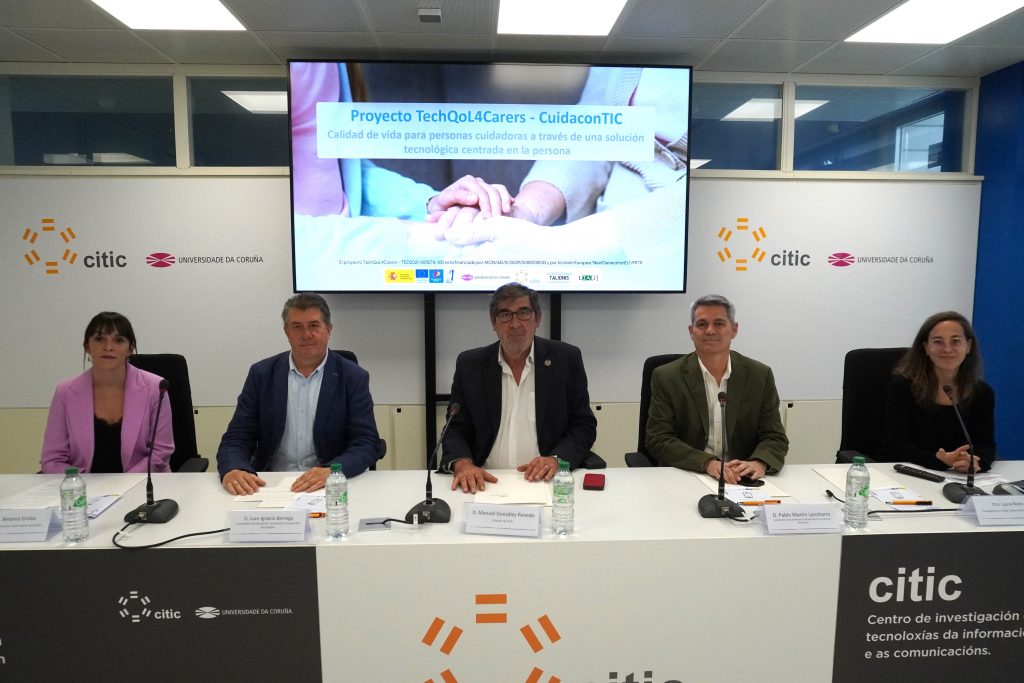
CuidaconTIC: Technology to Support Caregivers
- CITIC at the University of A Coruña hosted the presentation of the TechQoL4Carers project, aimed at improving the quality of life for informal caregivers—family members or close individuals who care for people with dependency living at home.
- The platform stands out for integrating wearable devices, such as smartwatches and fitness trackers, which enable the continuous collection of health data.
A Coruña, November 8, 2024.- Researchers at CITIC presented today TechQoL4Carers, an innovative initiative to develop CuidaconTIC, a technological solution designed to enhance caregivers’ quality of life, the effectiveness of their care, their occupational balance, self-management of health, and overall empowerment.
The CuidaconTIC platform stands out for integrating wearable devices, such as smartwatches and fitness trackers, which continuously collect health data. These devices record detailed information on physical activity (steps, distance, active time, and calories burned), sleep (total sleep time, REM, light and deep sleep stages, and awake time), and heart rate (daily minimum, average, and maximum). The data sync with apps like Google Fit, enabling easy visualization and management. The platform provides instant access to data, personalized recommendations for improving quality of life, and promotes health awareness by setting clear activity and rest goals.
The event featured contributions from CITIC Director Manuel González Penedo, Deputy Director Javier Pereira, Pablo Martín Lancharro, Deputy Director for Social Care and Innovation at the Xunta de Galicia’s Ministry of Social Policy and Equality, and Juan Ignacio Borrego Vázquez, Councilor for Education, Training, and Technological Innovation in A Coruña. Additionally, lead project researchers María Betania Groba González and Laura Nieto Riveiro shared preliminary findings, followed by a live demonstration of the CuidaconTIC platform. A panel discussion with informal caregivers and professionals from partner organizations rounded out the event, offering insights and experiences from the pilot study.
“The involvement of CITIC in inclusive technology reflects a commitment that goes beyond technological research; it aims to directly improve people’s lives, especially those who play essential roles in society, like informal caregivers. At CITIC, we believe technological innovation is only truly complete if it is accessible, useful, and sustainable for everyone,” emphasized Javier Pereira, Deputy Director of CITIC and coordinator of the research team behind this initiative.
Inclusive technology
TechQoL4Carers is coordinated by the TALIONIS research group in collaboration with the LIA[2] group, both part of CITIC, and funded by Spain’s Ministry of Science and Innovation and the EU through Next Generation funds. The initiative is built around a web platform integrated with a mobile app and wearable devices, offering personalized services for informal caregivers. Caregivers can monitor and track data related to their quality of life, occupational balance, the impact of caregiving, and general health. Notifications and suggestions based on their data, alongside online training content, provide valuable support for both caregiving and self-care.
Women: the primary caregivers
In Spain, between 10.8% and 23% of the population takes on informal caregiving roles, often dedicating more than 20 hours per week to this activity. Women represent nearly 90% of caregivers, particularly those aged 45 to 64. While caregiving can bring meaningful rewards, it also has significant impacts on caregivers’ lives. The COVID-19 pandemic underscored the urgent need to address the societal challenge of caregiving.
CuidaconTIC aims to be a key resource in this context, offering tools such as daily health data summaries, visualizations of physical activity and sleep patterns, weekly well-being questionnaires, and a personalized advice system. By integrating wearable devices, the platform facilitates continuous health monitoring, helping caregivers maintain their quality of life and adopt healthier.





